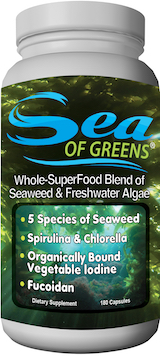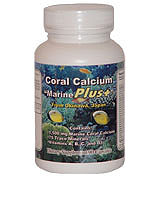Bladderwrack
Bladderwrack (Fucus vesiculosus,) aka black tang, rockweed, bladder fucus, sea oak, black tany, cut weed, dyers fucus, red fucus, and rock wrack, is a brown seaweed (kelp) harvested from cool ocean waters around world, easily recognized by its air-filled thalli or "bladders" that keep the plant afloat.
Bladderwrack is one of the highest iodine containing sea vegetables known. The iodine in bladderwrack is present in the form of di-iodotyrosine (DIT) which is a normal precursor of the Thryoid Hormones T4 (Thyroxine) and T3 (tri-iodothyronine). T4 is manufactured by the condensing of DIT and thyroid peroxidase enzyme in the follicular luminae of the thyroid gland. The naturally occurring source of iodine makes Bladderwrack a great choice in the support of a healthy functioning thyroid gland, when more iodine is required for optimal function.
Also of interest is the high amount of fucoidin found in Bladderwrack. Fucoidans and Fucans are sulfated polysaccharides found in most brown seaweeds. These substances have been researched for modulating a healthy inflammatory response, and have shown strong properties for supporting a healthy immune system and intestinal flora.
Bladderwrack is also recognized as a source of other naturally occurring minerals such as iron, zinc, magnesium, potassium, calcium, magnesium, potassium, sodium, sulfur, silicon and iron and is also high in some B-complex vitamins. It contains moderate amounts of phosphorus, selenium, manganese and zinc and small amounts of vitamins A, C, E and G. Bladderwrack also contains anti-sterility vitamin S as well as vitamin K. It is rich in algin and mannitol, carotene and zeaxantin with traces of bromine.















